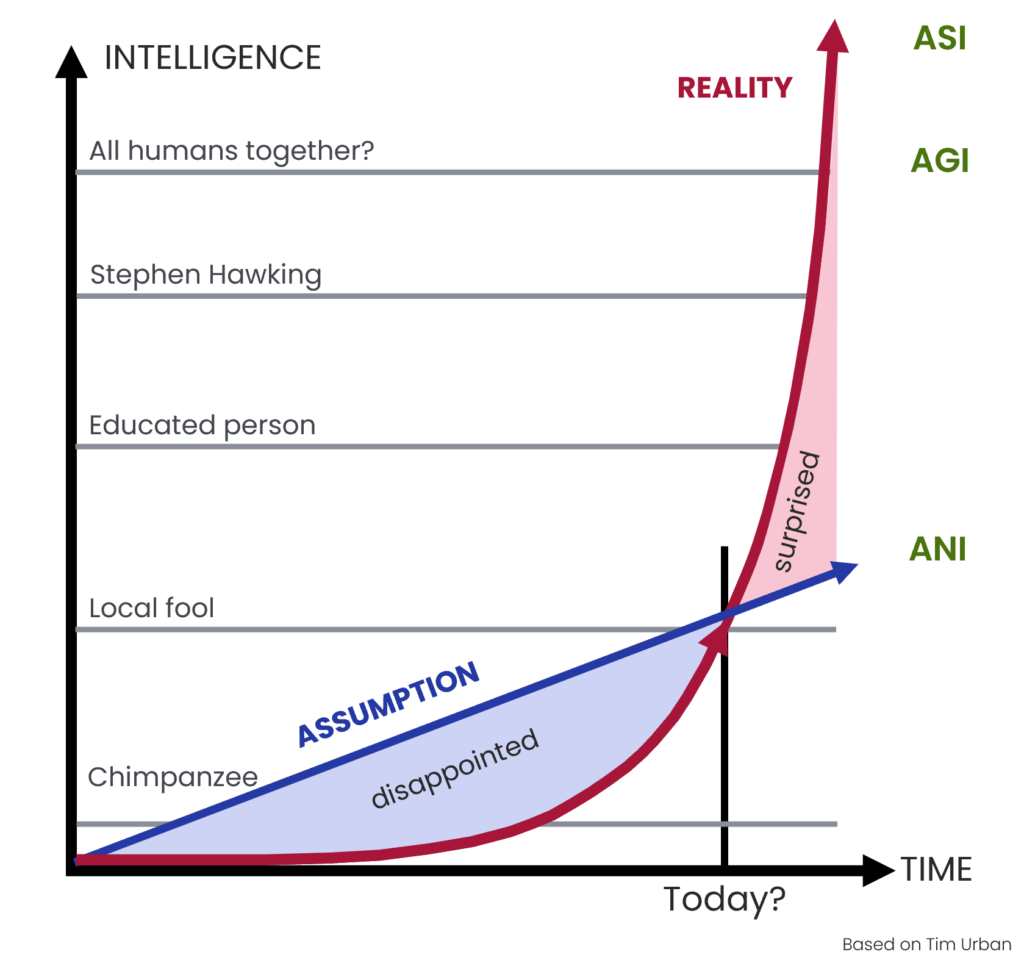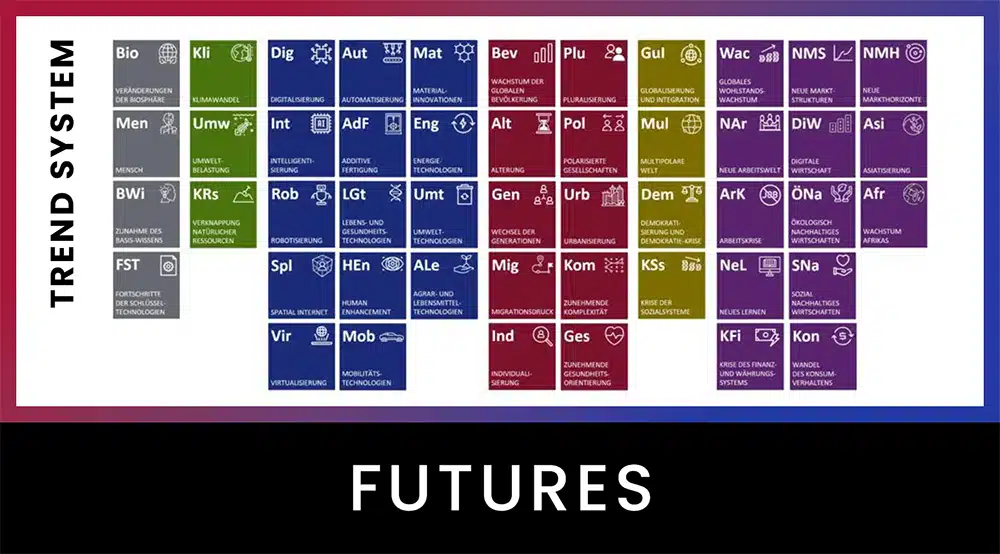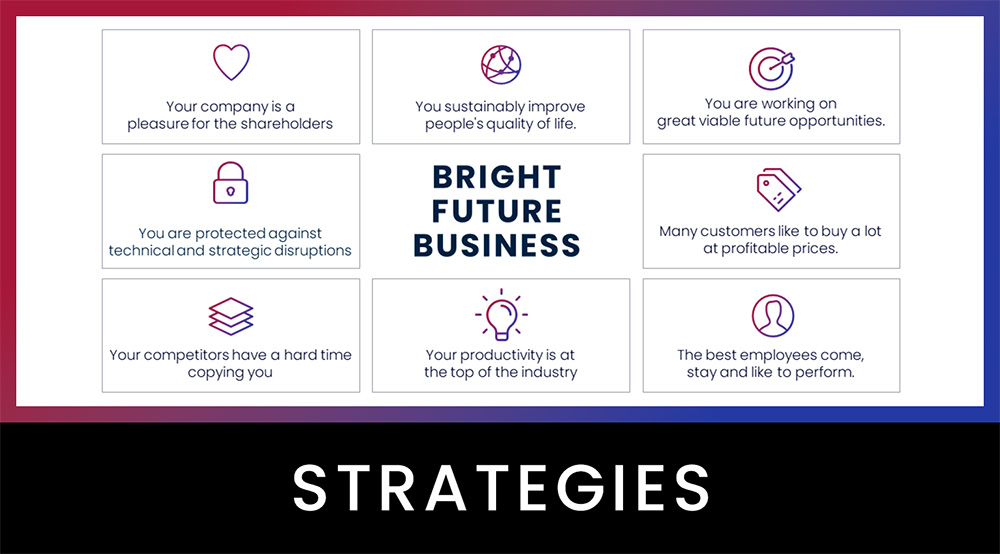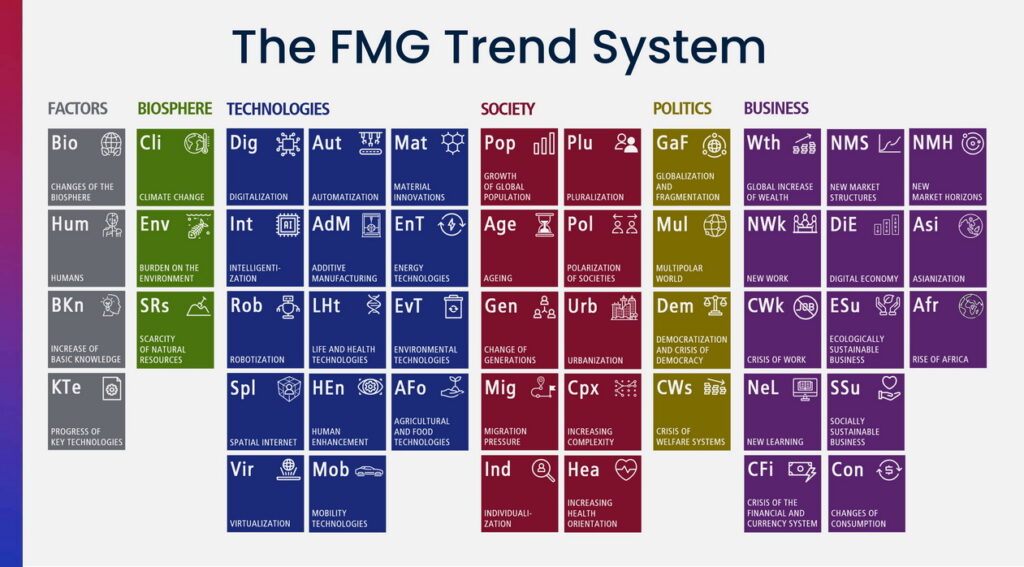Dr. Pero Mićić
Many people make fun of what ChatGPT & Co. cannot do. How fast will AI improve? You will get my answer to this question in this article. In this article, I only look at performance. We’ll think about ethics, dangers and consequences in other articles.
AI – this is how fast it will be in the future
How will the performance of artificial intelligence develop over time? Tim Urban once visualized this. I have adapted it here for our purposes here.
As we have often experienced in recent years, people have difficulty imagining exponential developments. We generally assume that things develop linearly. The same is true for AI. For over 70 years, most people have only heard about AI and perhaps understood that when they shop on Amazon, watch videos on Netflix, or use Facebook, Instagram, and Linkedin, simple forms of AI are at work. This is artificial narrow intelligence. Such AI is applied for the analysis of CT images, voice recognition, face recognition, object recognition, chatbots, Siri, Alexa, intelligent image editing, etc. ANI is always a specialist. It can only do the one thing.
The general public believes that we are currently at the level of the village fool who can merely parrot everything.

But what is actually happening is that the performance and quality of AI systems are increasing exponentially. As always with such developments, it starts very slowly and imperceptibly and remains far below expectations. That’s why we were disappointed for decades about the seemingly low practical relevance of AI.
Then, however, the advances become faster and faster. German engineer at Google Hartmut Neven once said that with doubly exponential growth, it is like this: “It looks like nothing is happening, and then – oops – you’re in a different world“. For the nerds: doubly exponential means that the exponent has another exponent.
As mentioned, most people intuitively believe that we are currently at the level of the village idiot at best. But even that is more than wrong. If we only look at the ability to answer general knowledge questions, I assume that there is currently no single person on this planet who can answer questions as broadly and deeply and pass all tests without explicit preparation like the GPTs. So they are already at least at the level of a very educated person.
Whole teams of scientists even confirm “sparks of artificial general intelligence” in GPT4.

What is crucial: it will not take decades again for AI to reach the level of intelligence of Stephen Hawking or Albert Einstein. Rather, it will likely be a matter of just a few years. Ray Kurzweil, who has often be astonishingly correct with his assumptions said, that the point in time at which AI is as smart as all humans combined is the year 2029. This is artificial general intelligence. And he said this in 2014, long before the development of transformer models that are now astonishing people everywhere.
Then, probably a short time later, AI will be cognitively much stronger than all humans combined. Then we will have artificial super intelligence. At that point, we will face the great challenge of somehow managing to remain the boss of the AIs, so that AI does what humans want.
What factors play a role in the speed of development?
- The increase in performance of AI chips. The repurposed graphics chips from Nvidia or specialized chips like Tesla’s Dojo chips for autonomous driving are constantly increasing in power at a rapid pace. According to the aforementioned Neven, Neven’s Law was named for quantum computers, stating that the performance of quantum computers will increase at a doubly exponential rate. We won’t have quantum computers in our laptops, but quantum computers are already being used in clouds today. For example, by BASF to develop new materials.
- The amount of data. It will grow to unimaginable levels because we will use many billions and soon trillions of sensors. This includes cameras, thermometers, smell sensors, RADAR, LIDAR, etc.
- Networking of knowledge systems. Through APIs, or data and programming interfaces, the AIs will be able to tap into almost every solid source of knowledge, such as the mathematics platform Wolfram Alpha. Soon, they will have access to all human knowledge.
- The investments. Recently, someone commented that in three years, no one will be talking about ChatGPT anymore. Sorry, AI isn’t going away, as many wish, because they fear the unknown. Investments are increasing dramatically worldwide.
- The research: AI helps to research AI. The number of publications is growing enormously. Unfortunately, we in Europe are already lagging behind. At least in terms of the number of scientific publications, China is now the world leader.
- And most importantly: AI creates AI. This is probably the most underestimated factor. And again, it’s about an exponential development that people find difficult to comprehend. The better the AIs become, the better and faster they will be able to create the next generation of AI.
Bear in mind: I am only speaking here about the technical development. Yes, we must ensure that the data is of high quality, i.e., as truthful as possible. I have long advocated intensively for “truth technologies” to heal fake news, disinformation and misinformation. With AI, we can make the world of information and news really more trustworthy. We must ensure that malicious people can do as little damage as possible with AI. I am generally against a lot and especially against unnecessary regulation, but we must regulate AI, and as quickly as possible.
In light of this, it is simply short-sighted to make fun of the current shortcomings of AI systems. This is whistling in the dark. AI is being downplayed because people don’t want to face the truth.
Now what?
As an entrepreneur or employee, you need a future strategy that includes an AI strategy.
It has often been said: it’s not AI that will destroy your job and your company, but people who can make productive use of AI. Even if you are older. You will hardly make it to retirement without using AI in your company or at least allowing it to be used. As an entrepreneur, it would be irresponsible to want to hand over your company at some point without it being set up for the AI era. Without an AI strategy, no company will be able to last long and no employee will really be able to be an excellent professional.
AI will develop faster than most people can imagine. As I have shown here. Because you can’t keep up with everything, you need a future strategy, including an AI strategy. AI will ultimately change everything in your business. Every product, every service, every process, and every project. AI is THE strategic topic for future-proof companies.
Joy of the future heals fear of the future. People who need to be pushed into the future, who need to be picked up and enticed, who want to ignore AI, will find it difficult professionally and entrepreneurially. Be aware of the immense benefits AI will have for improving the quality of life on this planet. And for your success. I know it’s anything but easy, but please learn to look forward to the future with AI.
Without a vision of the future, you can’t lead. Otherwise, everyone in your company will imagine their own vision of the future. And with all the many fears of the future, that is likely to be negative and depressing. Then your company is weak. Only with a positive, attractive, and credible vision of the future can you lead your employees and colleagues.
How much time is left until you not only have to develop your AI strategy but also implement it? None. Zero. The time to act is NOW!
We are happy to support you in this. We developed the first AI-based future strategies with our clients almost 20 years ago. Yes, we do this now for small businesses as well.
Just follow these links:
► The Future Strategy Program for SMEs
► Free video crash course THE FUTURE OF YOUR BUSINESS
► BUSINESS WARGAMING for robust business and future opportunities
► KEYNOTES by Pero Mićić for your employees and customers
Have a bright future!
Placeholder


































